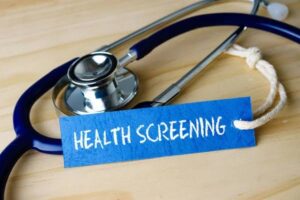Understanding Health Screening:
A Vital Tool for Preventive Care
Health screening is an essential process that helps identify potential health issues before they become serious problems. It involves a range of tests and examinations designed to detect diseases in their early stages, allowing for timely intervention and better health outcomes. Here’s a closer look at what health screening entails, its importance, and the common types of screenings available.
What is Health screening?

Health screening refers to the systematic evaluation of individuals to identify signs of diseases or risk factors. Unlike diagnostic tests, which are performed when symptoms are present, screenings are proactive measures aimed at healthy individuals or those at risk.
Why is Health Screening Important?
1. Diogenes on Time:
Deseases can be recurred if timely diagnosed. Many diseases develop silently as cancer, diabetes, and hypertension, and it will be diagnosed when time is lost. Screening can help to start early treatment to over come issues.
2. Prevention:
By identifying risk factors (like high cholesterol or obesity), individuals can take steps to prevent the 6 of diseases through lifestyle changes or medications.
3. Informed Decision-Making:
Regular screenings empower individuals with knowledge about their health, allowing them to make informed choices regarding their lifestyle and medical care.
4. Cost-Effective:
Detecting and treating diseases early can be less expensive than managing advanced stages of illness, which often require more intensive care.
Screening Types :
1. Blood Pressure Screening:
This is crucial for identifying hypertension, a significant risk factor for heart disease and stroke.
2. Cholesterol Screening:
A blood test that measures cholesterol levels can help assess the risk of heart disease.
3. Blood Glucose Testing:
This test checks for diabetes or prediabetes by measuring the level of glucose in the blood.
4. Cancer Screenings:
Common screenings include:
- Mammograms for breast cancer
- Pap smears for cervical cancer
- Colonoscopy for colorectal cancer
5. Body Mass Index (BMI):
Calculating BMI helps determine if a person is underweight, normal weight, overweight, or obese, which can influence health risk assessments.
6. Vision and Hearing Tests:
Regular check-ups can detect problems that might affect daily life.
- Who Should Get Screened
Screening recommendations can vary based on age, gender, family history, and lifestyle factors. Generally, adults should start regular screenings at specific age milestones, but consulting a healthcare provider is crucial to tailor screenings to individual needs.
https://hinaaliabidi.com/health-and-fitness-tips/#more-242
Conclusion

Health screening is a critical component of preventive healthcare. By understanding its importance and participating in regular screenings, individuals can take proactive steps toward maintaining their health. It’s always a good idea to discuss with a healthcare provider which screenings are appropriate for you based on your health history and risk factors. Prioritizing health screening can lead to a longer, healthier life.